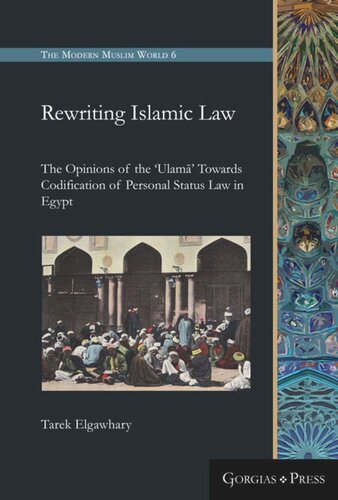

Most ebook files are in PDF format, so you can easily read them using various software such as Foxit Reader or directly on the Google Chrome browser.
Some ebook files are released by publishers in other formats such as .awz, .mobi, .epub, .fb2, etc. You may need to install specific software to read these formats on mobile/PC, such as Calibre.
Please read the tutorial at this link: https://ebookbell.com/faq
We offer FREE conversion to the popular formats you request; however, this may take some time. Therefore, right after payment, please email us, and we will try to provide the service as quickly as possible.
For some exceptional file formats or broken links (if any), please refrain from opening any disputes. Instead, email us first, and we will try to assist within a maximum of 6 hours.
EbookBell Team

4.0
46 reviewsThe codification process of personal status laws in Egypt began in the mid-1800s, continuing until the abolition of the Sharī‘a courts in 1955, with the absorption of personal these statutes into the newly drafted civil code and the national courts that administered them. Throughout this period, legal codification entailed finding appropriate rulings from the annals of Islamic law and structuring these rulings using the model and language of European legal codes, usually the French code. Prior to this, the area of personal status law was the exclusive domain of the ‘ulamā’ and the Sharī‘a. In Egypt, personal status laws were exclusively based on Ḥanafī law, and issues surrounding the consolidation and codification of these laws first took place within the framework of classical Islamic law, not outside of it. To understand the significance of the process of codification, therefore, it is important to examine the attitudes of the ‘ulamā’ regarding it and its place within the edifice of Islamic law. Furthermore, since the ‘ulamā’ themselves are a diverse group, it is also important to understand the various approaches adopted to the process of codification to fully appreciate the great significance it had on the re-formatting and re-writing of Islamic law. "Sharia codification in the 19th and 20th centuries is an important chapter in the story of Islamic law and modernity. The author is an accomplished scholar, trained in both Western academia and at the al-Azhar Seminary, and has done a wonderful job of narrating and analyzing this historic process." H.E. Dr. Ali Gomaa, Former Grand Mufti of Egypt. "A fascinating and meticulously-researched study highlighting the tensions in turning shari'ah personal status laws into state law in Egypt during the twentieth century" HRH Prince Ghazi Bin Muhammad of Jordan.